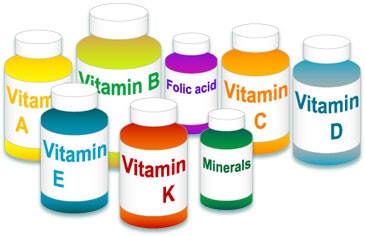Vitamins, Minerals and Supplements

What are vitamins?
A vitamin is an organic compound required as a nutrient in tiny amounts by an organism. A compound is called a vitamin when it cannot be synthesized in sufficient quantities by an organism, and must be obtained from the diet.
Are there different types of vitamins?
Yes. Vitamins can be classified as fat soluble or water soluble vitamins
Why should I know about the types of vitamins?
Fat soluble vitamins require fatty substances to metabolize them, therefore tend to get accumulated in the body. Overdose of fat soluble vitamins can themselves cause problems. The fat soluble vitamins are A, D, E and K. Water soluble vitamins are easily metabolized and excreted from the body and therefore have a lesser chance of being accumulated in the body. The B group of vitamins and vitamin C are water soluble. However, some forms of vitamin b such a B3, B7 can cause overdosing even though they are water soluble.
Are vitamins important?
Vitamins have a wide range of functions, from acting as important co enzymes in chemical reactions to actually functioning as hormones. Therefore optimal levels of vitamins are EXTREMELY important for the human body.
Are vitamins important in childhood too?
Not only are vitamins important in childhood, but are important even before the child is born. These nutrients facilitate the chemical reactions that produce among other things, skin, bone, and muscle. If there is serious deficiency in one or more of these nutrients, a child may develop a deficiency disease. Even minor deficiencies may cause permanent damage.

Are foods the only source of vitamins?
For the most part, vitamins are obtained with food, but a few are obtained by other means. For example, microorganisms in the intestine—commonly known as “gut flora”—produce vitamin K and biotin, while one form of vitamin D is synthesized in the skin with the help of the natural ultraviolet wavelength of sunlight. However these are not sufficient for the body and therefore food sources of vitamins are extremely essential.
When can one have vitamin deficiencies?
Deficiencies of vitamins are classified as either primary or secondary. A primary deficiency occurs when an organism does not get enough of the vitamin in its food. A secondary deficiency may be due to an underlying disorder that prevents or limits the absorption or use of the vitamin, due to a “lifestyle factor”.
What can cause the vitamins to not be absorbed efficiently?
Smoking, excessive alcohol consumption or the use of medications that interfere with the absorption, among other factors can cause poor absorption of vitamins leading to ill health.
Do I need vitamins in my diet every day?
Because human bodies do not store most vitamins, humans must consume them regularly to avoid deficiency. Human bodily stores for different vitamins vary widely; vitamins A, D, and B12 are stored in significant amounts in the human body, mainly in the liver, [27] and an adult human’s diet may be deficient in vitamins A and B12 for many months before developing a deficiency condition. However almost every kind of food that you take contains a certain amount of different vitamins and therefore you do take vitamins everyday even without your knowledge. So yes, you need vitamins in your diet, but do you need supplements or not is a completely different question!
What are the common vitamins that cause vitamin deficiency disorders?
Well-known human vitamin deficiencies involve thiamine (beriberi), niacin (pellagra), vitamin C (scurvy) and vitamin D (rickets). In the developing countries, other vitamin disorders are also very common, including Vitamin A and Vitamin B12.
Can you have vitamin overdose?
Yes, you can. In large doses, some vitamins have documented side effects that tend to be more severe with a larger dosage. The likelihood of consuming too much of any vitamin from food is remote, but overdosing from vitamin supplementation does occur.
What about recent reports about vitamin supplements being ‘useless’?
At the outset, remember that most of these studies are based on the western world, where their needs are different from ours and nutritional deficiencies are relatively rare. What is being extensively studied is to find out if taking a lot of vitamins can actually prevent diseases like heart attacks and cancer. However that does not mean that there are no vitamin deficiencies in your body. There is enough proof today with structured well reputed studies without any conflicts of interest that have shown the role of vitamins and other micronutrients in the role of preventing and attacking oxidative stress, which is now considered to be the root cause of a number of diseases. So, optimum doses of vitamins are an absolute necessary. The question comes back to ‘Do you need vitamin supplements?’ for which the obvious answer is that it depends on the current status of your health!
So vitamins and supplements will not protect me from cancer and heart diseases?
That is a tricky question. Lack of vitamins and certain essential minerals will make you prone to heart diseases and cancer and therefore supplements will help you. But if the cause of these diseases in your body is not due to deficiencies, then taking excess vitamins will not protect you.
There are a few. Recent studies have shown that too much of Vit E and maybe even Vit C in smokers make them prone to Lung Cancers. In the same way, retinoids (a form of Vitamin A) MUST be avoided during pregnancy. People prone to kidney stones must avoid calcium supplements except under medical supervision. Amino acid supplements can worsen kidney function in patients with kidney failure and should not be taken except under medical supervision. But do not panic, this information is not to scare you, but to make you aware that taking a single supplement is not the way to go.
So I do not have specific health issues, I can safely take vitamin supplements. Is that right?
Even with certain chronic lifestyle diseases like diabetes and increased blood pressure, you can safely take most of the Vitamin B and C group without much adverse effects. If you plan to undergo any elective surgery or if you have generalized illness like infections, vitamins will help you recover sooner.
Can you mention certain generalized conditions for which I can take supplements?
Normally, if you have attained menopause and have not been diagnosed with kidney stones, it is optimal to take a daily dose of calcium supplements. Both men and women can take Vitamin B and C supplements in normal daily doses. If you are NOT a smoker and if you have a family history of any kind of cancer, anti oxidant supplements like Vitamin E can be taken in minimal doses safely. People who are diabetic or hypertensive or both and without any kidney complications can also take amino acid supplements safely. However, do let your doctor know of all the supplements you take for him to optimize your medications
Our collaborator, is preventive care and wellness physician, Dr. Wasim Mohideen. A medical professional with an MBA and Post Graduate training in Allopathy as well as Alternative medicine, he strives to bridge the gap between modern medicine, traditional treatments and healthcare management.

